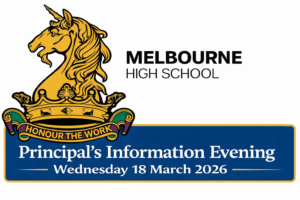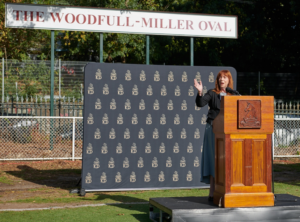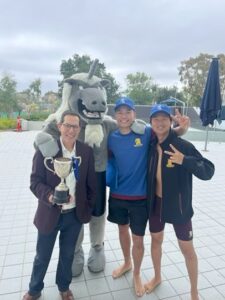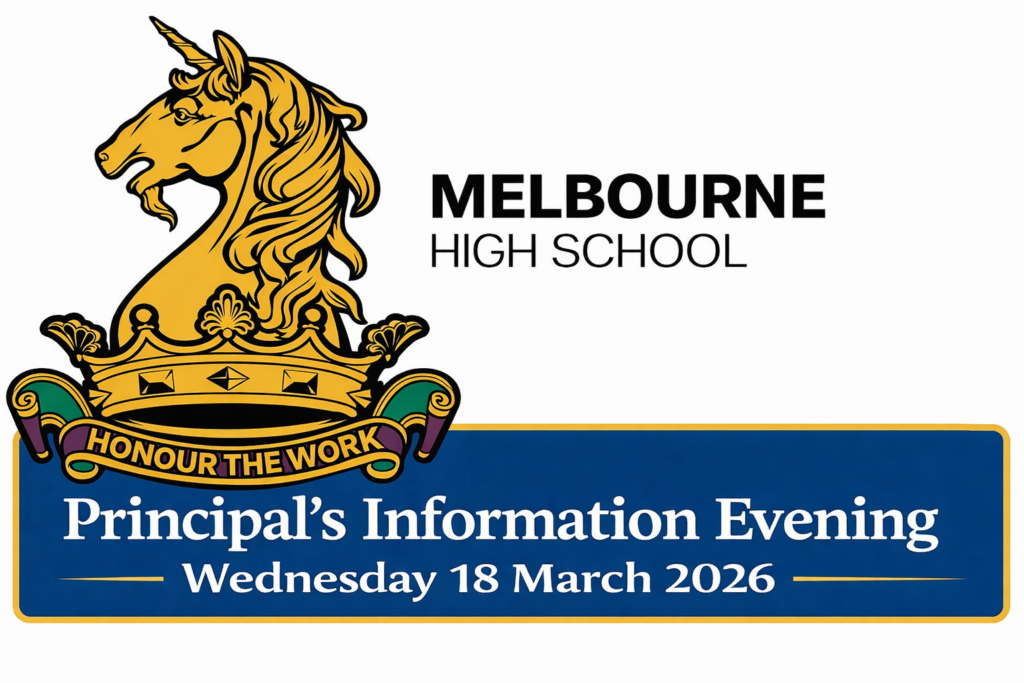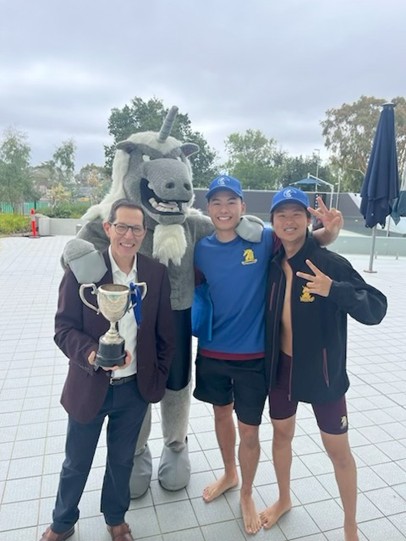Vale Dr Alan Gregory, B.Com., M.Ed., Ph.D., A.M.
9 May 1938 – 28 April 2024
MHS 1952-1955
Dear members of the Melbourne High School Community,
It is with great sadness that I write to advise of the passing of our Historian Dr Alan Gregory. I extend my sincere condolences to his wife Beryl and children Christian and Elizabeth and their families.
Our Archivist Luke Savage has written a beautiful obituary.


Obituary
Vale Dr Alan Gregory, B.Com., M.Ed., Ph.D., A.M.
9 May 1938 – 28 April 2024
Melbourne High School has lost one of its great supporters with the death of its Historian, Dr Alan Gregory. Best known for his comprehensive centennial history of the School, Strong Like Its’ Pillars (2005). Ray Willis appointed him a Patron of the School in recognition of his support.
Alan’s connection with the Melbourne High School began at birth, the doctor who delivered him was Ellen Balaam, a student at the old Continuation School 1906-1909. Alan attended Spring Street Central School in Malvern, an area his family had lived in for some time. He played in the Under 14 XVIII team in 1952, though he was better known for his involvement in the intellectual side of the School. In 1954 he was in the Forrest House play, debating team and was house Conductor. He was also editor of the Sentinel, which was then published every few weeks, and printed on a duplicating machine at the school. In his Matric year, he was again Forrest House conductor, played in the football team, captained the cricket team, was in the House and School Debating teams (captain), and in acted in the School Play (the Mystery of Manfred Moon, which Max Gillies also acted in). He was appointed a Prefect, and the 1955 Prefects would continue to meet yearly for many decades. 1955 was the 50th Anniversary of the School, with various events to celebrate, including the Prefects of both schools being inducted at the Melbourne Town Hall, by Dr Ellen Balaam.
Awarded a Secondary Studentship with the Education Department and a Commonwealth Scholarship, he took the studentship as it provided a living allowance. After completing his Commerce degree in 1959 and diploma of education in 1961, he was Secretary of the S.R.C. and in the 1956-1957 holidays, he was part of a student delegation to Indonesia, including a meeting with President Sukarno. Many decades later he was still able to speak basic Indonesian. Alan was secretary of the Australia-Indonesian Association of Victoria. He was also involved in the Immigration Reform Group, helping to write the pamphlet Control or Colour Bar in 1960, part of the movement to end the White Australia policy. This was a time when Colombo Plan students were beginning the opening up of Australia to the concept non-white migration.
Alan received a Rotary Scholarship to study at the University of Bombay, India. In 1960-1961, he would make many lifelong friends in India, and would recall being one of very few westerners in Bombay at the time. He was immediately appointed to the Economics Department Cricket Team, on the basis that all Australians could play cricket, a myth he quickly shattered. When H.M.A.S. Melbourne made a visit to Bombay, Alan was invited onboard for a reception, and appreciated the drinks, Bombay then being a dry city. Alan visited India several times in his later life, staying at the Bombay Yacht Club.
His first teaching appointment was to Ballarat West High School where he taught Commerce. Alan loved teaching, and his students remember him, often approaching him decades later.
Alan then transferred to Brighton High School, where George Stirling was the Principal. George, a former School Captain of MHS in 1920 and a teacher 1926-1937, was delighted, and Alan was soon directing the Opera, Trial By Jury in 1966. By 1965 he was a part time Economics Method lecturer at Monash University in the Education Faculty, completing his Bachelor of Education in 1966 and his Masters in 1972. His Masters was most notable for finally settling a point of contention. For a long time educational historians had been debating if Frank Tate, then an Inspector, later Director of Education, and founder of Melbourne High School, had met the British Social reformers, Beatrice and Sidney Webb when they visited Melbourne in 1898. The Webbs helped form the Fabian society, and the concept of evolution rather than revolution in left-wing politics. Despite much searching, no one could find evidence that they had met, until Alan Gregory, reading through various files for his Masters, found a letter of complaint from an Inspector, as Frank Tate had shown the Webbs around a school in his district.
In 1969 Alan was appointed full time at Monash, thus ending his career as a teacher with the Education Department. Needing a doctorate to further his career, but with a young family limiting time, he arranged a sabbatical at Simon Fraser University in Canada to complete the research and write his Thesis. He was also for a time a visiting scholar at Cambridge University. Alan enjoyed his time at Monash University, it enabled him to be involved with the Commerce Teachers’ Association; with two Ministerial enquiries; he was acting sub-dean twice; and continuing his musical interest, he founded a faculty choir. In 1978 he was Foundation Chair of the Menzies Lecture Trust, which he ran for many years. The 1981 lecture, which was given by Margaret Thatcher, was much complicated when it became known that an IRA hitman was in the country. He became close friends with Pierre Gorman, the deaf academic, and would later run the Gorman Foundation set up under Piere’s will. Pierre’s father, Eugene, had worked alongside George Langley during WWII. In 1989 he was made a Member of the Order of Australia for his services to Education. The following year he was appointed Master of Ormond College at Melbourne University. After leaving Ormond, he worked as an Education Consultant and historian.
He wrote a history of Lord Somers Camp (1994), which he had attended as a student, and would continue to attend the Oldies camp for many years; of the Royal Melbourne Hospital (1998); the Trauma Committee of the Royal Australasian College of Surgeons (located on the old school site); several histories of National Can Industries; the Cormack Foundation; as well as editing a collection of the Menzies Lecture Trust lecture (1999).
Appointed School Historian at Melbourne High School in 1998, it would take 6 years to write and publish his monumental history of the school. Alan was also appointed a Member of the Migration Review Tribunal in 1999 (also cross appointed to the Refugee Review Tribunal), which he worked two days a week until 2012. He was also on the Victorian Place Names Committee and Chair of the Victorian Pathology Review Board and Adjunct Professor at the Graduate School, Swinburne University.
Alan then wrote a biography of Brigadier George Langley, MHS Principal 1949-1956. Langley had had a big impact on Alan as a student (as George did on most of his students). Alan remained in touch, visiting him in Sydney during his retirement. After George’s death in 1971, he encouraged Esmee, George’s widow, to complete his war memoirs (published as Sand, Sweat and Camels). Alan maintained a prodigious correspondence with many people, the coming of email saved much in postage. A biography of William Woodfull (2011) followed, and at his death, he was working on the history of St George’s Malvern, which he had taken over from Brian Corless, and several other projects.
Active in many areas, he was a member of the Melbourne Club, editing its newsletter for a time and on several committees; a lifelong following of the Melbourne Football Club, he would attend the Grand Final each year; he was the organist at St George’s Malvern for many years; and weekends were often spent at Barwon Heads at the family holiday house. A succession of (mostly) black labradors would be walked around Central Park, before a coffee.
Alan was a very generous and warm man, and his family was central to his life. Beryl his wife, and their children, Michael, Christian and Elizabeth, and four grand-children. Beryl was also a teacher, for a time at Wesley College, and then Principal of Christ Church Grammar School in South Yarra. Alan was most proud of his children’s careers. Michael’s early death in 2019 was a devastating blow. In failing health, he continued to attend Church regularly, including the morning of the day of his death.
He has truly Honoured the Work, and his work has Honoured him.
Luke Savage, Honorary School Archivist, and friend.
